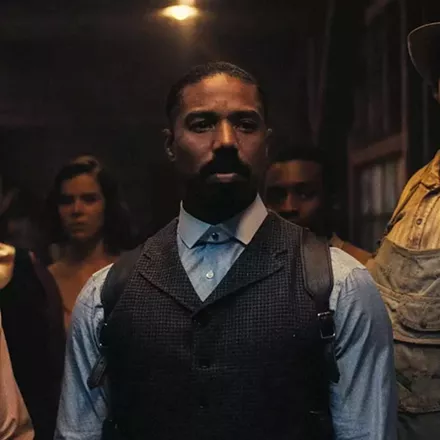For those who missed it, in 1971--before the advent of experimental ethics, administrative oversight and common sense--psychologist Phillip Zimbardo decided it would be a good idea to create a makeshift prison and fill it with pretend guards and prisoners drawn from Stanford University's student populace.
The experiment, meant to last for 14 days, was ended after six because, in Zimbardo's words, the "guards became sadistic." In the 2001 German release Das Experiment, director Oliver Hirschbiegel and writers Don Bohlinger, Cristoph Darnstädt and Mario Giordano (yes, this movie is so good it took two Germans and an Italian to write it) ask the question: "What would have happened if the experiment had continued?"
Which is really a much more realistic question than the original experiment claimed to be asking. Zimbardo thought his experiment would answer the question, "Does humanity win over evil, or does evil triumph?"
Duh! Everyone knows that evil always triumphs. And, of course, in both the Zimbardo experiment and the movie Das Experiment, evil does triumph--sort of.
Das Experiment starts with cab driver Tarek Fahd picking up an attractive young woman in his cab, and then picking her up in the more prosaic sense of the term. Charmingly, some of these early scenes are ripped off from Taxi Driver, and include a saxophone piece in homage to that film's Bernard Herrmann soundtrack.
After a touching night of what the Germans call "der schnitzel fun," Tarek reports to a local university to take part in the titular experiment. However, Tarek is not the mild-mannered taxi driver he first appeared to be. Rather, he is an undercover reporter who has super-powered eyeglasses that contain a hidden, high-resolution camera.
It is his plan to photograph and report on the goings-on in the experiment, and to make his story more interesting, he tries to incite the guards to violence and the prisoners to disobedience.
Now, this is a bad idea, even in our modern American prisons with their meticulous systems of safety and control that have always prevented guards from ever abusing prisoners. When you do this with a bunch of amateurs, well, things get out of hand pretty quickly.
Which is not only what Tarek wanted, but also what the experimenters wanted. In fact, they've chosen Tarek and one of the guards, a man named Berus, precisely because they have the kind of personalities that generally clash.
Here, "clash" can be taken to mean "lead to bloody German-style violence." And I think we all know that bloody, German-style violence is the most cinematic type of violence there is.
Which is one of the reasons why Das Experiment is successful on almost every level. What's strangest and best about it, though, is that it works as a psychological drama with actual intellectual depth and as an action film with excellent pacing and exciting on-screen action sequences. I don't think I've ever actually seen a film that bridged that gap so well before.
In order to do this, the ending is more action-oriented and the beginning is more psychologically oriented, but that's not really a problem, as the psychological drama has more than enough tension to keep the film rolling along.
Moritz Bleibtreu is especially fun as Tarek. You may remember Bleibtreu as Manni the Boyfriend in Run Lola Run. He's only grown more handsome and adept at acting in the intervening years, such that, when not admiring the chiseled curves of his well-wrought features, you may find yourself lost in the cohesive character he creates for this film.
In fact, none of the actors are bad, and most of them are excellent. By sinking so deeply into their characters, they create the sense that this truly is an experiment out of control. As the violence mounts and the guards become more brutal, and, well, German, and the prisoners become more submissive and depressed (also, strangely enough, German traits) the mood of the film slides towards mounting tension.
Individual conflicts begin to carry horrifying weight, and suspense mounts as Tarek's girlfriend tries to find him and stumbles into a full-fledged riot in what was supposed to be a pretend prison.
Although the story and imagery in Das Experiment are disturbing, I think this is a film that anyone who can stomach movie violence would enjoy. Well, the action-film fans will enjoy it. The intellectual art-movie lovers will only say that they were stimulated by its cogent analytic of asymmetrical power relations.
But that's just egghead talk for, "Cool movie, dude!"










